Herbs Comps Week 2: Tonify Blood and Expel Parasites
1/10
There's no tags or description
Looks like no tags are added yet.
Name | Mastery | Learn | Test | Matching | Spaced | Call with Kai |
|---|
No analytics yet
Send a link to your students to track their progress
11 Terms
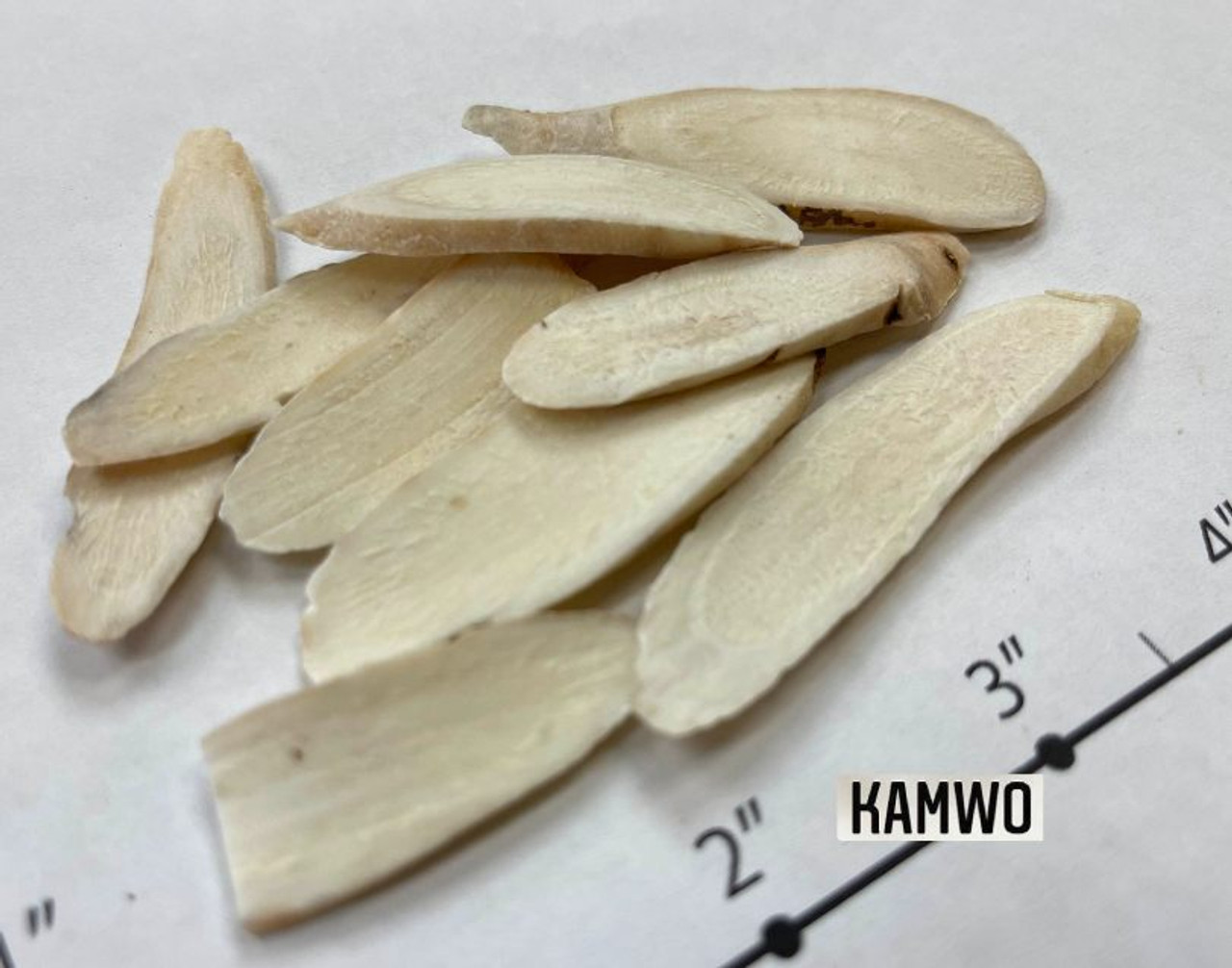
pinyin, latin, mnemonic, category
pinyin, latin, key words (4 words), category
ID Herb - B
BAI SHAO/ Paeoniae Radix Alba 白芍 “white peony”
bitter, sour, mildly cold ——— LR, SP
Tonify Blood A Herb - ID
Bai - Marisa - SLYM - spleen, liver yang, menses
-tonifies the LR blood (regulates menses)
-extinguishes wind, stops pain (LR yang)
-nourishes LR and SP* yin (only this and Long Yan Rou)
1.) Nourishes Blood and Regulates Menses a not of herbs that can regulate menses and tonify essence
-mesntrual dyfunction, vaginal discharge, and uterine blooding
4 substances: Dang Gui, Chuang Xiong, Bai Shao, Shu Di Huang. Order matters, but maybe not for quiz. also for painful menses: will talk about more later. def -> stag -> pain.
2.) Calms and Curbs the Liver Yang and Alleviates Pain: common for LR qi stagnation: flank, abdominal pain. w/ LR over-acting on SP. def Yang rising due to Yin/blood deficiency. -> HA, dizziness, epistaxis, inverted menses bleeding in the chest, LU (hemoptysis), sweating, People w/ yin deficiency (common in menopausal women. have both yin and yang deficiency). One of the best for this. Can add shu di huang to nourish yin. Curb = prevent from rising pain: no nervous system .
3.) Preserves the Yin and Adjusts the Nutritive and Protective Levels: ying and wei. Bai Shao and Gui Zhi restore balance of Wei Qi and Ying Qi wei - opening and closing of pores. Bai Shao is a potent astringent. works as a branch. Astringing sweat (from deficiency) menopausal = yin deficieency sweating stool - minimize loss of electrolytes (more deficiency, stool). and from Stool from excess (dysentary inflammation of LI. LI needs to reuptake fluids. inflamed, gets lots of water. diarrhea) Dysentery w/ cramps - this herb is great bc it treats cramps and stool vaginal discharge deficeincy bleeding. excess sweat (just need to clear heat, not tonify) used a lot in meonpausal sweating. anchor yang
Dosage: 6-15g. Use dry to pacify the Liver, dry-fry to nourish the blood and harmonizing the nutritive and protective levels. Good quality is thick firm, straight, powdery, and without cracks. we usually use 30 g
awesome herb. can talk about for a long time. Chi Shao is for invigorate blood. This is white.
Augment essence: Shu Di Huang. He Shou Wu
Regulating Menses: Bai Shao, Dang Gui, Xiang Fu
Paired herbs: Chai Hu and Bai Shao in Si Ni San. complement. Chai hu spreads dispersing diopheretic LR qi. Dui Yao. Can use Chai Hu too much - too dispersing.
Bai Shao - is astringing. holds things in. Balances it out. Chai Hu is more Upper Jiao (diopheretic). Bai Shao is more MJ and LJ. For menstrual, will not be using Chai Hu.
Xiang Fu is also paired with these 2 herbs commonly
we usually use 30g. -can cause constipation though just use other herbs
regulates menses by nourishing blood … but also by soothing the LR (2ndary function)
GYN is LR channel. free flow of qi. very important herb for gyno
Lr channel is nervous system. cramping. smooth muscle skeletal muscle.
for menstrual cramps 18-30g.
abdominal cramps. spasms. larger doses for obgyn.
NSAIDS - western.
Category Questions:
1) All major herbs in Tonify blood go to what channel?
2) 1 exception:
3) Common Pattern
4) Flavor?
1) Liver channel
2) only Longyan Rou and BaiShao go to Spleen
3) Liver blood deficiency
4) Sweet
Lóngyǎn ròu/ Longan Arillus 龍眼肉 Logan Fruit
sweet, warm ———- HT, SP
Tonify the Blood - B Herb - ID
-nourishes the blood
-tonifies the qi
-calms the spirit
1) Tonifies and Augments the Heart and Spleen, Nourishes the blood, and Calms the Spirit: for insomnia, HT palpitations, forgetfulness, or dizziness due to HT and SP def. Commonly used for problems associated w/ excessive pensiveness or overwork. Can be taken alone as a tea.
spirit resides in HT. nourishes HT blood. Not all herbs do (so does Da Zao). If blood def w/ insomnia. Dang gui just nourishes all over blood. also SP. Many things can cause insomnia. Don’t use for HT heat (not gonna help well).
Forgetfulness - due to SP and HT def. SP manufactures HT. HT governs. SP resides w/in HT. if you see this symptom this is typically how we’ll treat through SP and HT
Gui Pi Tang has this
Caution & Contraindications: Contraindicated in those with fire from constraint, phlegm with qi stagnation, or obstruction due to dampness
Dosage: 9-15g. (large dosages: up to 30g). Often eaten alone or taken as an infusion. Good quality is large, soft, translucent, yellowish brown, sweet, and with a thick flesh.
can buy around this time. Ppl will buy pungent, tropical sweet fruit,
from pungent, tropical fruits, Damp-heat - toxic: mangoes - lips swell up.
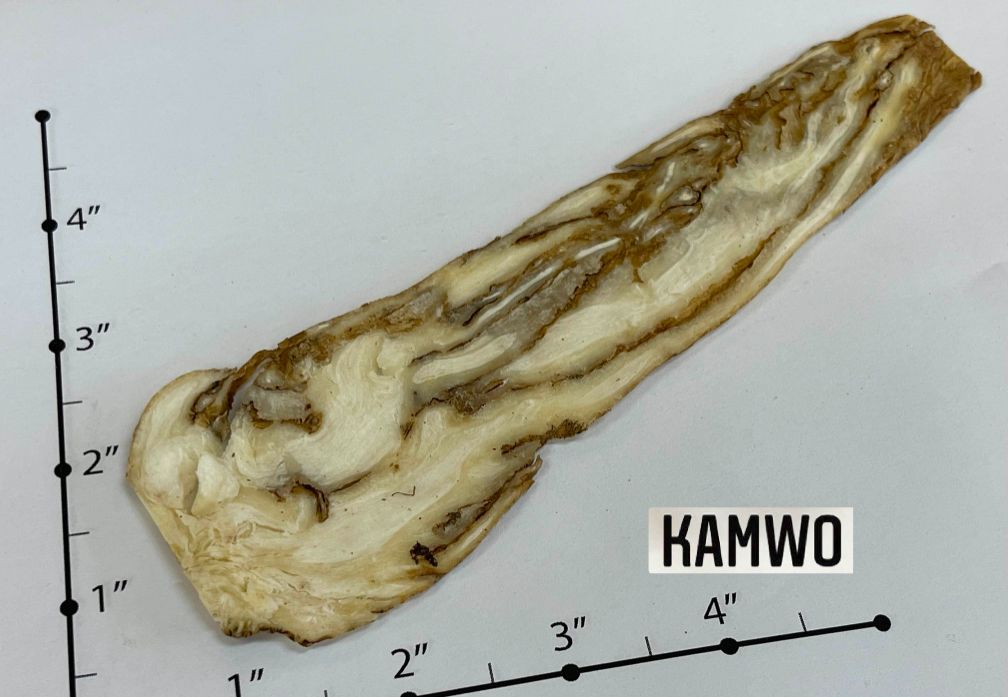
pinyin, latin, key words (2 + 1*), category
ID Herb - B
Dāng Guī / Angelicae sinensis Radix 當歸 pg.742
“state of return” -tx gyno patterns, settles qi and bld to return to normal. (return qi and blood to proper place)
sweet, acrid, warm ———- HT, LV, SP
Tonify the Blood - A Herb - ID
-tonifies the blood,
-invigorates* the blood (for cold)
-regulates menstruation,
-alleviates pains
1) Tonifies the blood and regulates the MENSES: Tiao Jing - regulate menses. restore healthy normal menstrual cycle. regulate mesnse is not mechanism specific. Not always from tonifying blood. (bnsk) for blood def, esp HT and LR.(TL: tonifies blood within blood. Huang Qi - qi w/in blood.)
2) Invigorates and harmonizes the blood and DISPERSE cold:
disperses cold -stagnation. abd pain. traumatic injury, carbuncles due to blood stasis, esp. w/ cold from deficiency. reynaud’s - poor circulation to finger tips - blue. Dang Gui Si Ni Tang. Best tx for Reynaud’s move to the bahamas.
3) MOISTENS the Intestines and unblocks the bowels: for dry intestines due to blood deficiency (aka old people, more deficient, post-partum women) anemic, blood def women. Bang luo anemia. very dry. zao (3) drying. blood deficient and not susceptible to the heat. will not rear its ugly head and damage the yin). (
4) Reduce swelling, expel pus, generates FLESH, and alleviates pain: use in treating sores and abscesses. from deficiency. (concavity). little b blood flow,. get to promote discharge of pus. Can be from bed sores. Facilitate wound healing - by tonifying blood.
5) Treats COUGH:
yin/blood deficiency cough. adjunct herb. can harmonize the blood in case of qi rebellion in case of coughing. chronic cough, asthma due to yin def.
exam: treats phlegmy yellow
don’t have to worry about extra Bensky stuff: something about bitter
Dosage: 4.5-15g.
Cautions & Contraindications: Contraindicated in those with diarrhea or abdominal fullness due to abundant dampness.
Tom: Regulate menses. Top herb for blood def and stasis. Sweetness tonifies and moistens
Acrid flavor disperses
Bitterness drains, and its warmth unblocks
All above good for harmonizing blood (both invigorates and tonifies)
harmonize —- invigorate —— break blood (spectrum)
(he xue) make sure it’s right amount of blood
Dang Gui can harmonize and invigorate based on dosage.
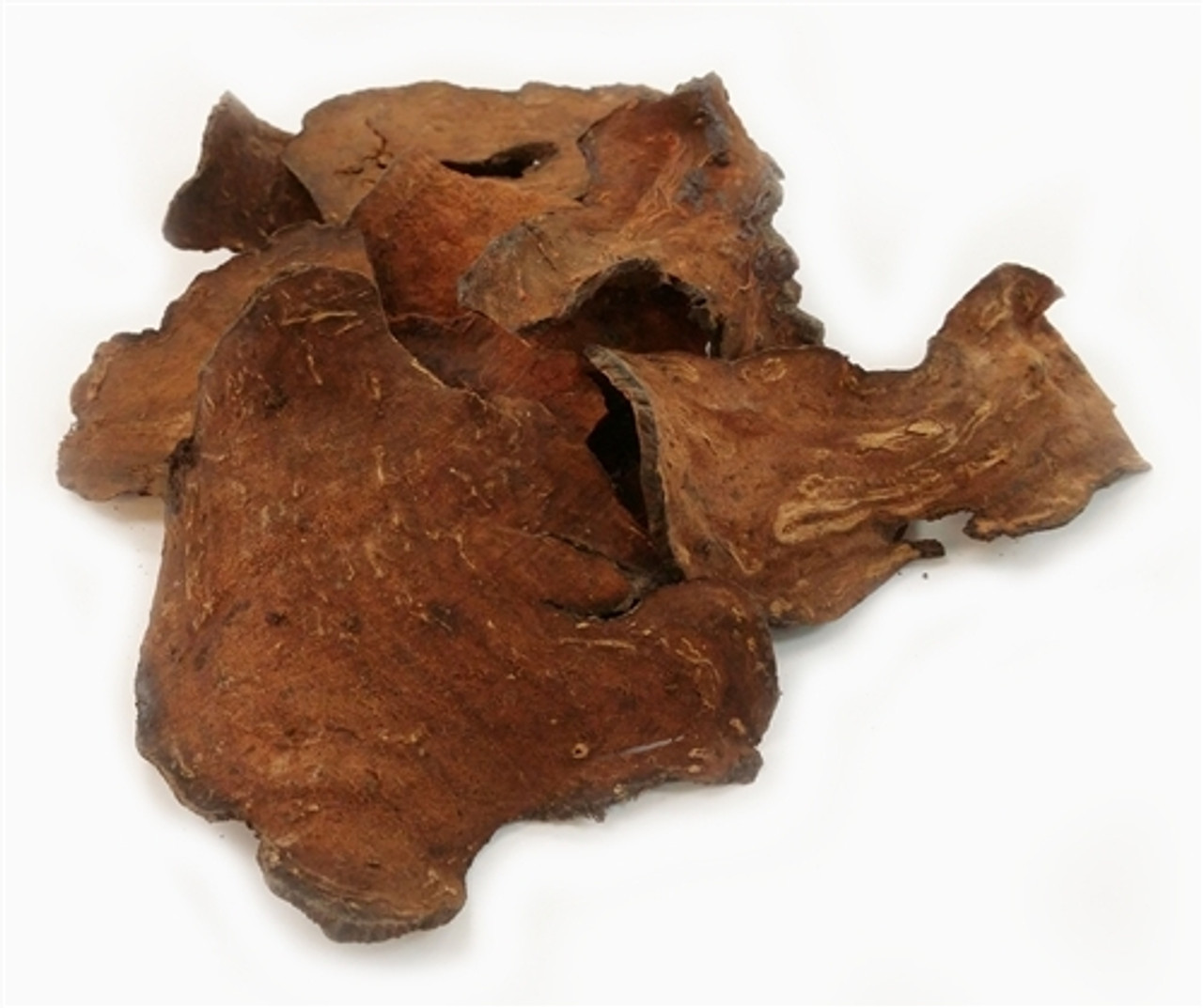
Not ID Herb - H Herb
pinyin, latin, mnemonic (3), category
(zhi) He Shou Wu/ Polygoni Multiflori Radix Preparata 何首烏 “Prepared crow-black-haired Mr. He”
bitter, sweet, astringent, slightly warm ——— LV, KI
Nourish the Blood - A Herb - not ID
Hair - poly. multi
BEY - blood, essence, yin
-nourishes blood and yin
-preserves the essence
1) Tonifies the Liver and Kidneys, Nourishes the blood, and Augments the Essence:
-not all herbs can augment the essence. hair is extension of yin blood and essence.
-premier herb for hair loss
Also tonifies blood. and weakness in black and knees (LR, KD yin and blood). soreness of extremities, insomnia (blood or yin def. insomnia)
both tonifies and preserves blood and yin. BNSK: for patterns of yin or blood def w/ signs like dizziness, blurred vision, premature greying of the hair, weakness of lower back and knees, soreness in extremities, nocturnal emissions, & insomnia.
2) Expels wind from the Skin by Nourishing the blood: for wind rash due to blood deficency. blood and anchors the wind. blood def = more susceptible to external pathogens. Post-partum women need to stay home. blood def -> qi def -> stay home. Need to stay home 30 days after birth. can manifest in skin (e.g. urticaria)
blood fills up the vessels and prevents the wind. qi is commander of blood. not enoug hwei qi - bc blood def. more susceptible. is the other route.
Neither cold nor drying, nor cloying. perfect OTC herb. Dang Gui is drying and cloying. Shu Di Huang is cloying.
does it work for hair loss? Depends on why you have hair loss - If baldness is genetic, no.
Mostly for postpartum women re: hair. chunks of hair will fall out after pregnancy (loss of blood and essence)
needs to be used internally. Blood invigorating herbs to excite and promote circulation in scalp would be the chief ingredient in shampoo.
Remark: Tonifying Blood herbs tend to be cloying and should be combined with other herbs that can strengthen the stomach or prevent cloying. minimal cloying.
Caution & Contraindications: Contraindicated in those with loose stools or significant dampness or phlegm.
*Modern research has shown that it has beneficial effect against cholesterol… best thing just not eating food w/ cholesterol. LR produces cholesterol. can be from LR activity.. Some people need to be on statins. Not a cure all. Doesn’t really recommend for this use though.
Dosage: 9-30g
claim to fame: for hair, esp gray hair. people will put it in drinks. surprised it’s not in chewing gum. … but is it?
Zhi is preparing from steaming or stewing
Zhi he shou wu is most popular
There’s a sheng He Shou Wu - when you’re trying to squeeze into your wedding dress. - potent laxative aid like senna.
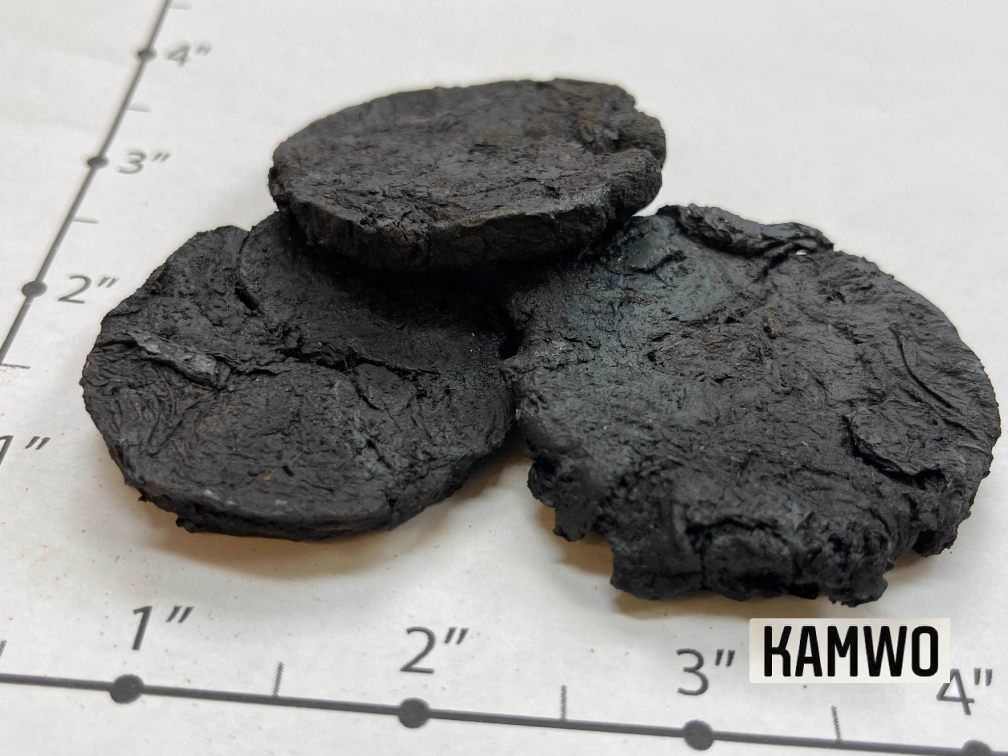
A Herb - Not ID
pinyin, latin, mnemonic (6-7 words), category
Shú Dì Huáng / Rehmanniae Radix preparata 熟地黃 “cooked earth yellow”
Tonify Blood - A Herb - Not ID
sweet, slightly warm —— HT, KI, LV
WAT? MEYB - wasting and thirsting, marrrow, essence, yin, blood
-tonifies the blood
-enriches the yin
-generates essence
-augments the marrow
31) Tonifies the blood: typical blood def manifestations. very commonly used w/ irregular menstruation, uterine bleeding (def. leads to stagnation. coagulation -slows down. -> bleeding), postpartum bleeding
2) Nourish the YIN: for LR and KD yin def. weak lower back and limbs (kd), ringing of ears, tinnitus (kd - yin def- > yang rises and causes ringing in ears), yin def, tidal fever, night sweats (yin def), KDs are source of yin. provides yin to other organs (basement, furnace analogy).
3) Strongly enriches the yin and relieves wasting and thirsting disorders: yin deficiency condition. -this herb particularly for lower burner wasting. standalone herb for this problem, can be.
4) Nourishes the blood and tonifies the ESSENCE:
for problems with/ both blood and essence e.g. delayed menstruation in children (amenorrhea, absence of menses). (e.g. premature graying of hair, post-partum, elderly, complexion: not as good - post-partum. pregnant: everything glowing, hair nails, etc.)
Sweet, warm, moist, and richly tonifying
Enters the LV, HT, KI to tonify the blood, enrich the yin, generate essence, and augment the marrow.
Primary herb to tonify the Liver and Kidneys
Dosage: 9-30g. [typical 12-15g. determined by other herbs, can Px tolerate dose. 30g not unusual) 30g is about one puck.
Cautions & Contraindications: This is a very cloying and rich substance that readily leads to stagnation of dampness and impedes digestion. It is contraindicated in those with qi stagnation and profuse phlegm, fullness, and pain in the abdomen, reduced appetite, and diarrhea.
Sheng Di Huang - clear heat and cool blood
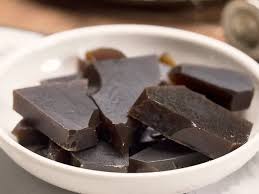
A Herb - Not ID
pinyin, latin, mnemonic (4), category
E Jiao/ Asini Corii Colla 阿膠 ass-hide glue
sweet, neutral (super cloying) —— KI, LV, LU
Tonify the Blood - A Herb - Not ID
E-Butt - E-BUM Essence Bleeding (lUng) Moistens
Tonifies the Blood -
-tonifies Liver blood
-moistens LU yin
-replenishes KD essence
-stops bleeding*
1) Tonifies the blood: palpitations due to blood def. supermarket herb really good for blood def. (bnsk) dizziness, sallow or pale complexion
2) Nourishes the blood and stops bleeding: old days for post-partum women (dying from hemorrhage.) claim to fame. Used for chronic uterine bleeding also
3) Nourishes and Moistens the Yin:
better options for moistens the yin. Use He Shou Wu and Dang Gui
Caution & Contraindications: Because of its heavy, cloying effect on the digestion, it is contraindicated in those with Spleen and Stomach deficiency, focal distention in the epigastrium, or diarrhea
Dosage: 3-9g. Not a high dose. Crush and dissolve in tea. If you cook together it’ll stick to your herbs.
Jackass - hide -> skin -> gelatinous cube.
Jiao = gelatin. E is from Dong E - region in China
most cloying substance in all of TCM
tastes like ass, gamey. very expensive. Best is from Shan Dong.
people buy it for for vanity. they think its good for beauty
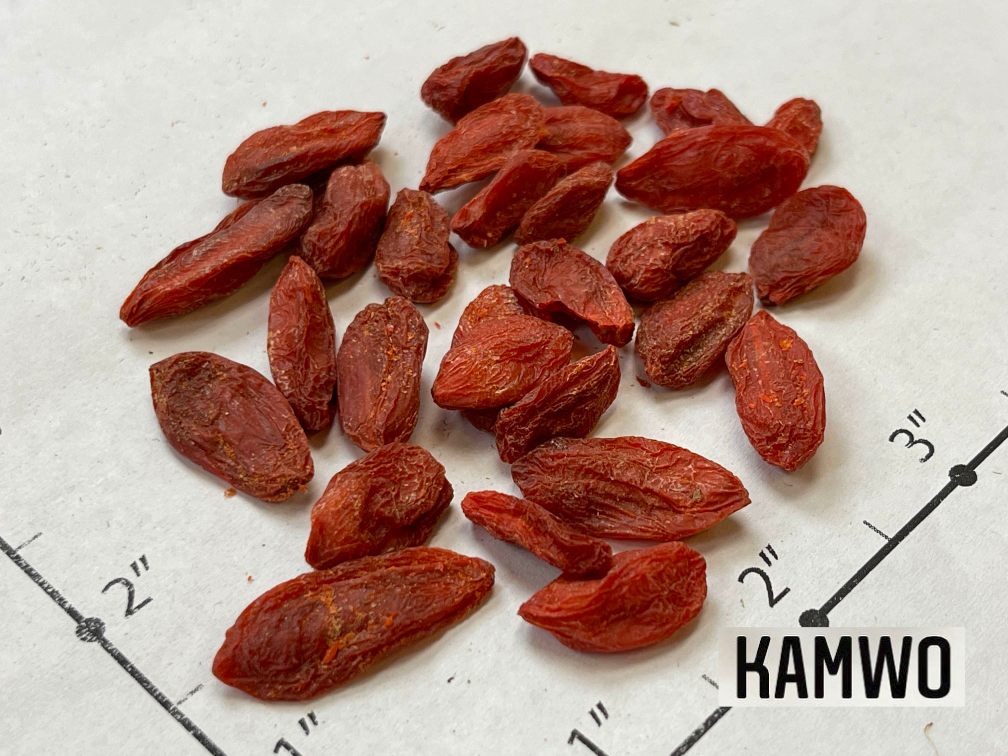
pinyin, latin, mnemonic (3), category
ID Herb - A
Gou Qi Zi/ Lycii Fructus 枸杞子 aka: Chinese Wolfberries
sweet, neutral —— LV, LU, KI
Tonify the Blood - A Herb - ID
Lucky - LU.K.EYE. Lung, Kid. Eye*.
-enriches the yin of the KDs and LU
-nourishes LR blood
-mildly tonifies the KD yang
1) Nourishes and Tonifies the Liver and Kidneys: for LR and KD yin and blood def patterns. sore back and legs. low-grade abdominal pain, nocturnal emissions, impotence (KD), wasting and thirsting (LR and KD yin), consumption (yin deficiency). Bc neither hot nor cold it is commonly used in treating LR and KD def.
2) Benefits the Essence and Brightens the eyes: claim to fame: dizziness, blurred vision and decreased visual acuity w/ age. w/ waning KD yin or blood def. Man Jing Zi is for eyes due to LR Yang rising. good for eyes. Ming Mu. LR and KD. LR opens to eyes. KD feeds yin to Lr. as Older, production of yin decreases as does the eyes. D
3) Enriches the Yin and Moistens the Lungs: moistens a lot of things. esp. LU, so that’s why its in soups. for chefs getting dehydrated from being above the stove all day.
Caution & Contraindications: While this is not as greasy and cloying as many other yin and blood tonics, those with Spleen defiency and dampness leading to diarrhea may still find it hard to digest. In those cases, the herb should be used with caution.
Dosage: 6-12g. Good quality is large, soft, sweet and red. It should have thick flesh and small seeds. L. Chinese has a smaller fruit and is regarded as inferior herbs. Too much can be a problem bc cloying. (If healthy middle jiao, can use)
“Goji berries” - antioxidants dean & deluca expensive. Other cultures use it singularly.
used in food and soups. either Da Zao or this anytime you see something red.
Don’t want cloying:
popular for nourishing blood. Augments Essence:
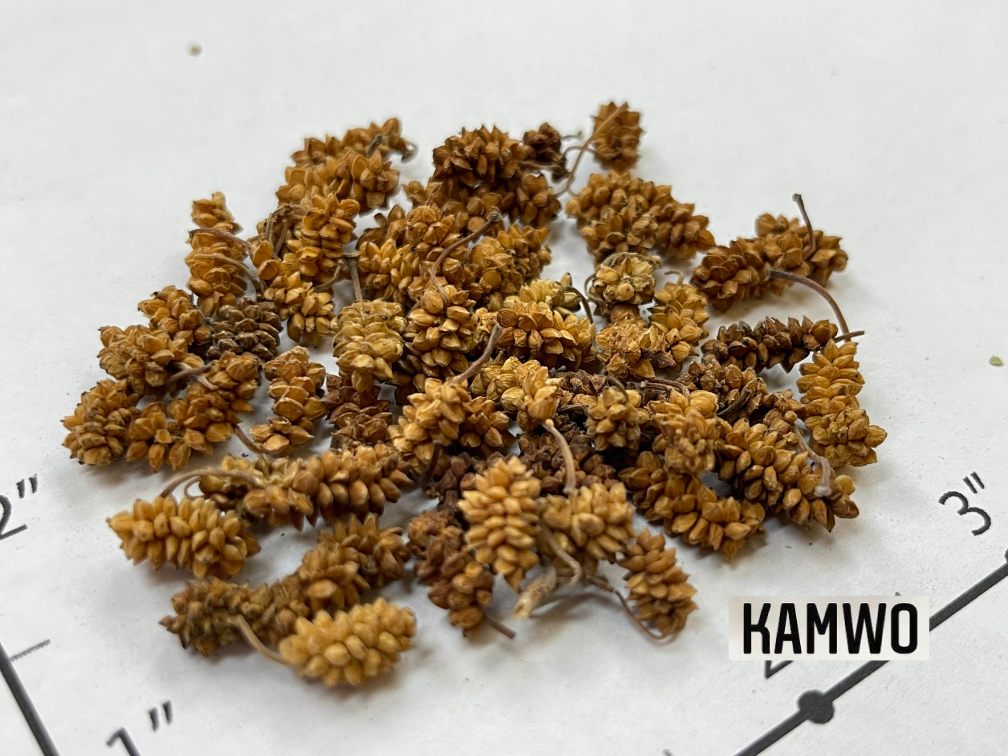
pinyin, latin, mnemonic (3), category
ID Herb - B
This one is the least cloying within cloying herbs.
Sang Shen/ Mori Fructus 桑椹 Mulberry Fruit
sweet, cold———-HT, LV, KI
Tonify Blood - B Herb - ID
mori - death - birth - gentle
gently - gentle yINTl - Int. Yin
-insomnia
-tinnitus
-intestines
Bensky:
-gently nourishes and cools the blood and yin
1) Tonifies the blood and Enriches the Yin: diizziness, ringing of ears, premature graying of hair - yin and blood def.
insomina: blood def. yin def and yin not being able to anchor yang. for old people. AM radio has advertising for tinnitus. super duper annoying for old people. or from repletion heat rising. wasting and thirsting
2) Moistens the Intestines: for constipation due to blood deficiency or insufficient fluids.
constipation - often , yin, qi, and blood def.
-ppl will buy laxatives, or senna and develop lazy colon. whenever i give won’t be equal to senna-cot. optimize physiology to help movement. you don’t move → will get constipation.
Caution & Contraindications: Contraindicated in cases with diarrhea due to cold from deficiency of the Spleen and Stomach.
Dosage: 9-15g. Good quality is large, intact, very sweet, purple, and has thick flesh. Often used in syrup form.
he doesn’t know what it means why it’s cold other than be aware of it for certain people. more slightly cold is his opinion. Nominally cold Sang Ji Sheng - parasite on the mulberry.
Cloying unless otherwise stated. This one is the least cloying within cloying herbs.
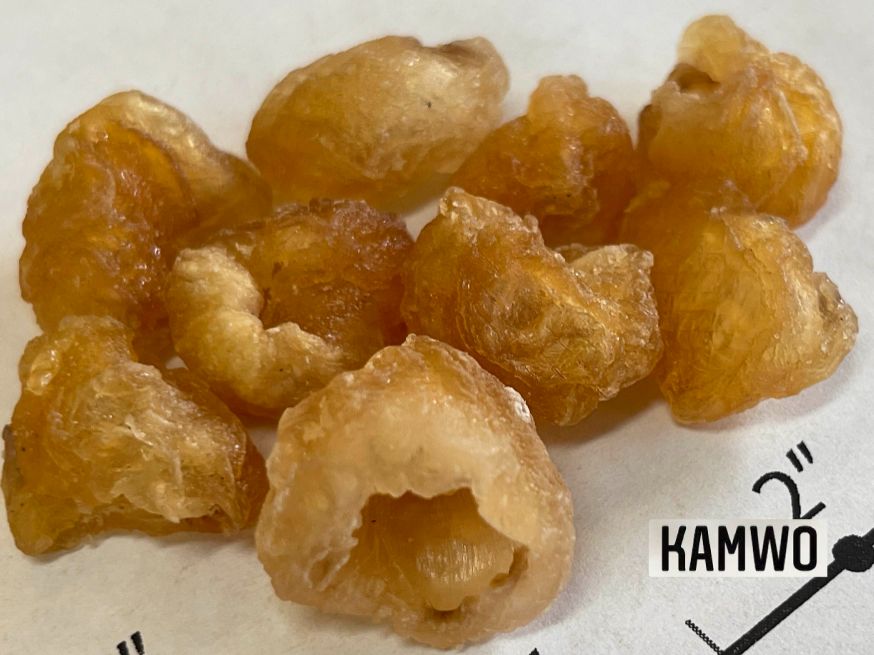
pinyin, latin, mnemonic (think of then name) keywords (3), category
ID Herb - B
Lóngyǎn ròu/ Longan Arillus 龍眼肉 Logan Fruit
sweet, warm ———- HT, SP
Tonify the Blood - B Herb - ID
dragon → air → spirit + qi.
eye → blood
-nourishes the blood
-tonifies the qi
-calms the spirit
1) Tonifies and Augments the Heart and Spleen, Nourishes the blood, and Calms the Spirit: for insomnia, HT palpitations, forgetfulness, or dizziness due to HT and SP def. Commonly used for problems associated w/ excessive pensiveness or overwork. Can be taken alone as a tea.
spirit resides in HT. nourishes HT blood. Not all herbs do (so does Da Zao). If blood def w/ insomnia. Dang gui just nourishes all over blood. also SP. Many things can cause insomnia. Don’t use for HT heat (not gonna help well).
Forgetfulness - due to SP and HT def. SP manufactures HT. HT governs. SP resides w/in HT. if you see this symptom this is typically how we’ll treat through SP and HT
Gui Pi Tang has this
Caution & Contraindications: Contraindicated in those with fire from constraint, phlegm with qi stagnation, or obstruction due to dampness
Dosage: 9-15g. (large dosages: up to 30g). Often eaten alone or taken as an infusion. Good quality is large, soft, translucent, yellowish brown, sweet, and with a thick flesh.
can buy around this time. Ppl will buy pungent, tropical sweet fruit,
from pungent, tropical fruits, Damp-heat - toxic: mangoes - lips swell up.
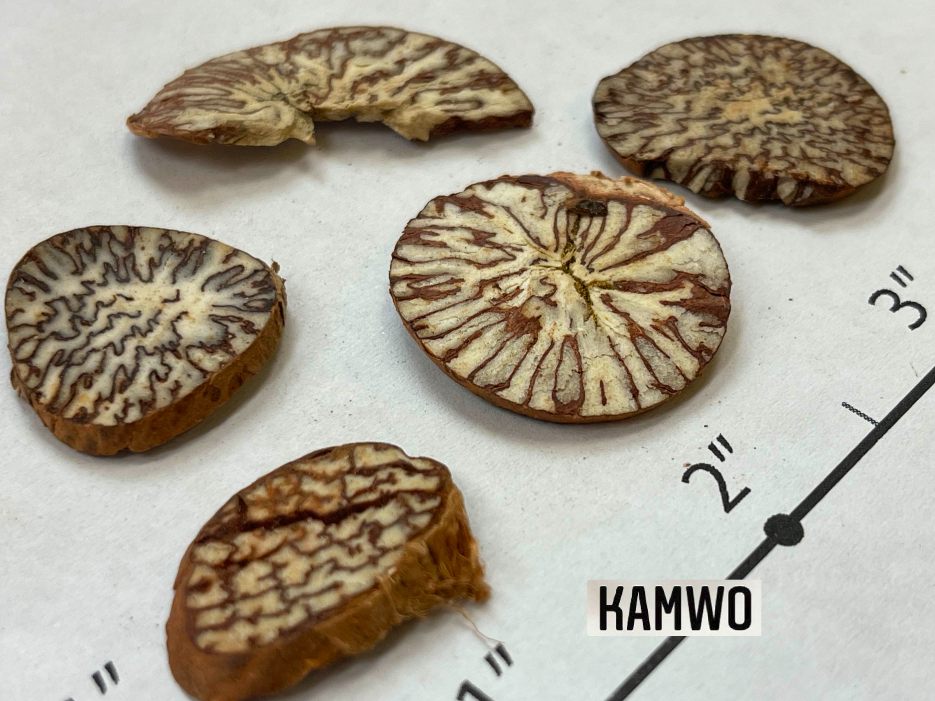
pinyin, latin, category, keywords (2)
actions (4), flavor (2/3), temp (1), channels (2),
Bing Lang/ Arecae Semen aka: betel nut 槟榔
acrid, bitter, warm, toxic LI, ST
-drain downward
-parasites, malaria
-LJ
_________
Bensky:
-expels parasites
-resolves firm accumulations
-facilitates urination
-resolves phlegm and food stagnation
-directs qi downward
1) Kills parasites:
kill a wide variety of intestinal parasite: flukes, blood flukes, roundworms
2) Promotes the movement of Qi, reduces accumulations, and leads stagnation out by mildly draining downward and unblocking the bowels:
very good for stagnant qi. moving it long. constipation, downbearing of qi. Da Fu Pi can do it too. More common is Zhi Zhi - constipation. Also Hu Po- magnoliae bark. for abodminal fullness, difficulty. tenesmus. urge to defecate w/ productive (stagnant qi)
3) Promotes the movement of qi and promotes urination:
side effect: produces diuresis. but also promotes urination - for damp-leg cold qi. Leg qi: Water congestion in channels from the knee to the foot. Inhibited urination. Get rid of edema. damp cold. gets rid of pathogenic water.
4) Also used for malarial disorders
Toxicity: Overdoses may lead to increased salivation (over 30g), vomiting, diuresis, and stupor.
Caution & Contraindications: Use with caution in cases of collapse of the middle qi
Dosage: 6-15g. Good quality is large, firm, and heavy with fresh-looking cross section without cracks.
toxic: can cause stupor:
betel nut - related to husk of betal nut. - Da Fu Pi (the shell - Herbs that Regulate Qi)
-people get high - like betel juice movie.
Don’t confuse with Da Fu Pi - Arecae Pericarpium
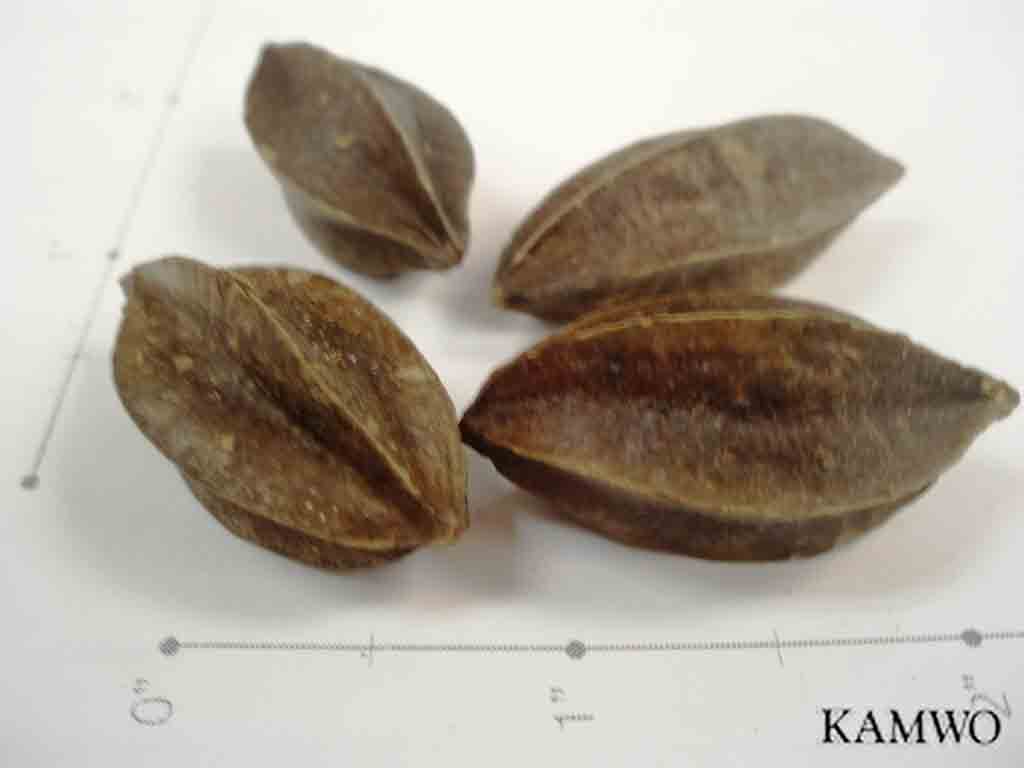
pinyin, latin, category, mnemonic (think of pinyin), keywords (2)
Shǐ jūnzǐ 使君子/ Quisqualis Fructus 使君子
sai2 (cause, make) + gwan1 (governor) + fruit
Properties: sweet, warm Channels: SP, ST
Kills Parasites - B Herb - ID
governor → parasites
-parasites
-SP
1) Kills parasites: hook worms. also trichomonis. relatively strong and effective herb.
2) Strengthens the Spleen and dissolves accumulations: Used for this function. for childhood nutritional impairment. poor appetite. and poor constitution. parasites mess up middle jiao. dapness due to worm infestiations. can be used in absence of worms. Can just be children w/ dampness, decreased appetite, not a big problem in the u.s. food not processing well.
when the function of sp to t&t is inhibited by developmental weakness, dampness results.
Caution & Contraindications: If taken with hot tea the patient may develop diarrhea and belching. Overdosage can also lead to belching, vomiting and dizziness.
Toxicity: nausea, vomiting, hiccough and belching are common side effects of this herb. Otherwise, it has a fairly low toxicity. **do not take with hot tea (will increase toxicity) - means cool tea or just don’t use it.
Dosage: 9-12g. Good quality peel is large, dark purple, and shiny; the seeds should be full, round, and pale yellow.
has a weird shape. no modern formulas use this.Not used in U.S..